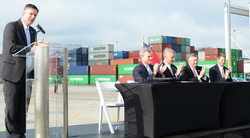
Georgia Ports, Georgia Tech, Center for Innovation partner for global logistics effort
A strategy to improve the flow of state, local and global trade goods got a boost Tuesday with the establishment of an official logistics partnership between the Georgia Ports Authority, Georgia Institute of Technology and Georgia Center of Innovation for Logistics.
Representatives from each of the three parties, along with U.S. Rep. Buddy Carter, signed a memorandum of understanding at the Garden City Terminal.
GPA’s Executive Director Griff Lynch said the partnership is about the “next corner,” in recalling a statement the late head of Apple Inc. made: ”‘We need to look for what is around the next corner.’”
“And that’s what this agreement is all about, what is around the next corner, what things we are not doing that we don’t know about and that we need to be doing,” Lynch said.
“We are applying the best tools in Georgia’s tool box by partnering with these two great organizations at Georgia Tech and the Center for Innovation, and our goal is to help and to continue to grow those 440,000 jobs that are directly and indirectly impacted by our ports.” The document outlines the next steps for the agreement.
GPA officials said the goal of the MOU is to “bring advanced research, evolving global logistics trends, and analysis from the world to Savannah.” The expertise at GPA and the innovation center and the analysis and research from Georgia Tech’s Supply Chain and Logistics Institute will help cargo owners and third-party logistics providers gain insight into everything from improved cargo routing to where and when to build infrastructure.
“Georgia Tech’s Supply Chain & Logistics Institute has established logistics improvement partnerships in global trade hubs, such as Rotterdam, Singapore, Shenzhen and Panama,” said Jimmy Allgood, GPA board chairman. “I am delighted to announce that for their first such agreement with a port authority in the Western Hemisphere, they have chosen an organization that is in their own state of Georgia.”
Georgia Tech’s President G.P. “Bud” Peterson looked to Tech’s past and pointed to the future.
“We were created to try and take an agrarian economy and move it to an industrial economy. And now we are moving to a knowledge economy with a strong basis and strong focus on things like supply chain management, logistics and the kinds of things that are happening here in Savannah,” Peterson said. “The types of things that make this port possible and continue to excel in the years to come.”
Matt Markham, director of the Georgia Center of Innovation for Logistics, said the collaborative effort further strengthens the state’s position as an economic development leader.
“Most companies that choose Georgia as their home depend on its world-class logistics for their success,” Markham said. “Our new relationship builds on our center’s goal of providing company-specific analyses and facilitating connections between logistics providers and potential clients.
“At the Center for Innovation, one of the top priorities is to work across the state with companies to connect them with the resources to benefit their logistics needs and help them compete and grow. Georgia Tech and the Georgia Ports are two of those great resources we work with and to be able to bring them together in a formal way will not only benefit companies here, but those looking to grow and move here,” Markham said.
The MOU signed on Tuesday states the intent of the parties is to enter into discussions to establish “precise research, academic and economic development arrangements.”
Objectives of the collaboration include, research, analysis and outreach on the impact of national and global logistics trends, including larger container vessels; driver shortages; road, rail and distribution facility infrastructure; beneficial cargo owner operations; new models of infrastructure planning; container balancing and staging, and import/export optimization. Longer-term themes are investigation of collaborative port planning across the region and investigation of offshore collaborative planning.
Education and economic development plans include identifying internships; co-operative education programs and class projects for Georgia Tech students with GPA and its partners; identifying life-long learning programs for GPA employees; investigating potential collaborative efforts to increase awareness of logistics career paths; supporting key economic development pursuits, and looking at the possible creation of a one-stop logistics collaborative lab and information center.
Lynch said the partnership would allow for continued port growth and provide a vital opportunity for focus.
“In this digital age as we visit our customers and travel around the world, they want to hear how we are going to make cargo more transparent, how we are going to help them reduce their costs, how we are going to create an environment with just a general ease of doing business,” Lynch said. “To continually focus on sustainable growth,” Lynch said. “We’ve had great, fantastic growth, growing 400 percent in the last 18 years from 1 million TEUs to over four million TEUs today. But we can’t rest, we need to keep pushing.”









